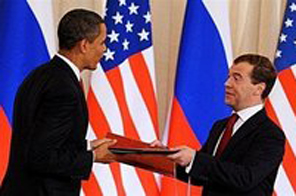Russia, US agree nuclear arms cuts
MOSCOW: Russian and US leaders Dmitry Medvedev and Barack Obama announced agreements on Afghanistan and cutting their nuclear arsenals as they sought a new era in battered relations.
The ex-Cold War foes issued a declaration on replacing a key disarmament treaty -- including figures for major cuts in nuclear warheads -- and clinched a breakthrough deal for US military transit for Afghanistan across Russia.
But as Obama made his first visit to Moscow as president, they still remained divided over US plans to install a missile defence shield in eastern Europe and Moscow's policy towards the pro-Western ex-Soviet state Georgia.
"The president and I agreed that the relationship between Russia and the United States (has suffered) from a sense of drift," Obama said at a joint news conference in the Kremlin with Medvedev.
"We resolved to reset US-Russian relations. Today after less than six months of collaboration (since coming to office) we have done exactly that," he added.
The declaration signed by the presidents pledges to reach a new nuclear arms reduction pact to replace the 1991 Strategic Arms Reduction Treaty (START). Obama said it provides for cuts of "up to a third" from current limitations.
It "commits both parties to a legally binding treaty that will reduce nuclear weapons," the White House said in a statement.
START is due to expire on December 5 but the declaration gave no target date for a renewal, instructing negotiators to complete the work as quickly as possible.
The declaration called for a reduction in the number of nuclear warheads in Russian and US strategic arsenals to between 1,500 and 1,675 within seven years and the number of ballistic missile carriers to between 500-1,100.
The cuts go beyond those levels set in the 2002 Strategic Offensive Reductions Treaty (SORT) which calls for both countries to reduce the number of deployed warheads to between 1,700 and 2,200 on either side by 2012.
"The declared reduction is a real agreement and it suits everyone," said Alexei Malashenko, analyst with the Carnegie Centre in Moscow.
"The Americans have decided to accept Russia as it is. Obama does not have the complexes from the Cold War and does not consider Russia to be an enemy of the United States."
Obama also proposed that the United States host a global nuclear security summit next year and suggested to Medvedev that Russia host a subsequent one in order to draft a new, "reinvigorated" non-proliferation treaty.
"We are seeing a pace of potential proliferation that we have not seen in quite some time," Obama said, pointing to "deep concern about Iran's pursuit of nuclear weapons capability" while "we've already seen North Korea flout its own commitments and international obligations in pursuit of nuclear weapons."
The Afghanistan agreement means Russia has authorised the use of its airspace for the transit of US troops and arms, a major boost for Obama's bid to step up the fight against the Taliban.
The deal permits up to 4,500 military flights per year, or about 12 per day, which can be loaded with troops, firearms, ammunition, military vehicles and spare parts, a senior US official said.
The official said military flights would not be charged air navigation fees and that they would not stop on Russian territory.
Previously Russia had only allowed the United States to ship non-lethal military supplies across its territory by train.
The two sides also signed an agreement to resume bilateral military cooperation suspended last August over Moscow's war in Georgia, an event which sent ties plummeting to a post Cold War low.
But amid the smiles and expressions of goodwill, the US plan to install missile defence facilities in the Czech Republic and Poland -- which Russia says threatens its security -- remained a major sticking point.
"The discussions on missile defence are proceeding with great difficulty because the approaches are very different," Russian Deputy Foreign Minister Sergei Ryabkov said, according to ITAR-TASS news agency.
Obama expressed hope however that "over time we will have seen that the US and Russian positions can be reconciled" and announced that both sides would step up their joint analysis of missile threats.
He also bluntly repeated the US dissatisfaction with Russia's recognition of two breakaway Georgian regions as independent, stressing Georgia's sovereignty and territorial integrity "must be respected".
"There are areas where we still disagree... we had a frank discussion on Georgia".
Obama was on Tuesday morning due to meet with Russia's powerful Prime Minister Vladimir Putin, a man who he described in the run-up to the summit as having "one foot" in the past of the Cold War.
He did not repeat that comment in the news conference, acknowledging that Putin was one of the "influential" figures he was going to meet and noting that Russia's ruling tandem were "working very effectively together".






